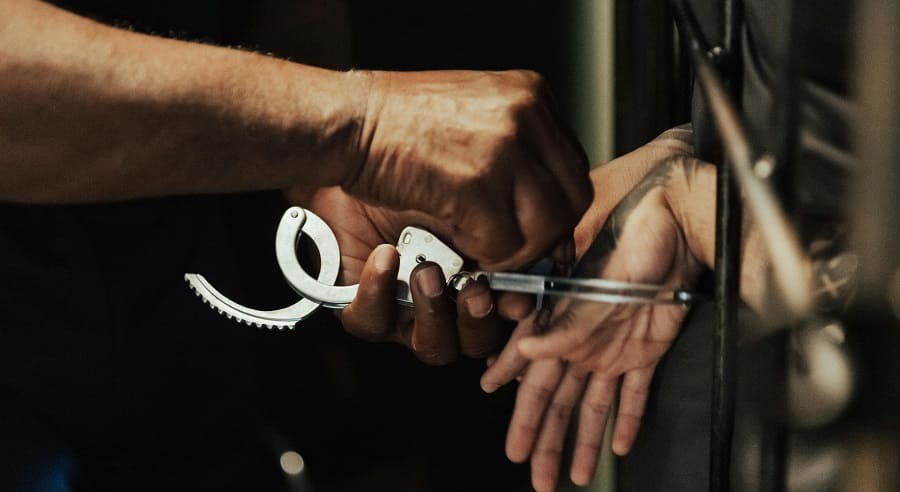Currently Empty: $0.00

What Happens After You Get Arrested in LA?
Getting arrested is never ideal. It’s often pretty unexpected, too. But what happens after you get arrested in Los Angeles specifically?
Being placed under arrest in LA typically begins with a police officer informing you of the charges against you. At this point, you need to think about your rights. The Miranda Rights, “You have the right to remain silent,” are more than just words from TV shows. They’re vital rights designed to protect you. Exercising these rights can prevent you from inadvertently providing information that could be used against you in court. Whether you’re innocent or guilty, you don’t want to be saying ANYTHING that could be misrepresented or misinterpreted.
Once under arrest, expect to be taken into custody. During this time, you’ll likely be searched, and any personal belongings will be temporarily confiscated. It’s important to stay calm and cooperative; this can impact how you’re treated and may influence subsequent legal processes.
You’ll need to seek legal representation as soon as possible. An attorney can help you understand the charges, the legal process ahead, and the options available to you. They can provide the necessary guidance to ensure your rights are protected throughout the ordeal.
Booking and Being Held in Custody
After an arrest, you will undergo a booking process at a local law enforcement station. This involves recording your personal information, fingerprinting, photographing, and sometimes conducting a physical search. Booking is a standard procedure, and understanding it can help ease your anxiety during this phase.
Following booking, you may be held in a holding cell, typically located within the station or a local jail. The duration of this stay depends on several factors, including the severity of the alleged crime and ongoing investigations. In some cases, suspects are released quickly, while in others, they may be held until their arraignment.
During this time, remain patient and cooperate with law enforcement. If you’re unsure about any aspect of the process, chat with your attorney. They can offer essential support and help expedite your release, if possible.
Understanding Bail and Release Options
One of the first concerns after an arrest is how soon you can be released. In LA, bail offers an opportunity for temporary release while awaiting trial. Bail is essentially a financial guarantee that you will appear in court for future proceedings. The amount is determined by the court and varies based on factors such as the severity of the crime and your criminal history.
If bail is set, you have options. You can pay the full amount, use a service that offers Los Angeles bail bonds, or, in some cases, be released on your recognizance (OR). OR release is granted at the court’s discretion and is more common in cases involving minor offenses and when the defendant is deemed a low flight risk.
Again, chat with your attorney when deciding on the best course of action for securing your release. They can help you understand the implications of each option and guide you through the process efficiently.
Arraignment Process
Arraignment is the next significant step following an arrest. This is your first formal court appearance, where the charges against you are read, and you will be asked to enter a plea. Plea options generally include guilty, not guilty, or no contest.
At this stage, having an attorney present is crucial. They can advocate on your behalf, negotiate plea deals if appropriate, and provide counsel on the best plea to enter based on your situation and the evidence presented.
Understanding the arraignment process is key to preparing for your defense. Your attorney will advise you on the potential outcomes and next steps, setting the stage for your case moving forward.
Preparing for Trial or Negotiating a Plea Bargain
Once arraigned, your case will proceed to trial unless a plea bargain is reached. A plea bargain is an agreement between you and the prosecutor to resolve the case without trial, often involving a lesser charge or reduced sentence. This can be a strategic option for many defendants, saving time, stress, and the uncertainty of a trial outcome.
If you opt for trial, preparation is essential. Your attorney will work to gather evidence, interview witnesses, and build a robust defense strategy. It’s important to communicate openly with your attorney during this time, providing any information that could aid in your defense.
The Role of Evidence and Discovery
Evidence is the backbone of any legal case, and understanding how it impacts your defense is crucial. During the discovery phase, both the defense and prosecution gather and exchange evidence relevant to the case. This can include witness statements, police reports, and any physical evidence collected at the time of arrest.
Your attorney’s role will ramp up a gear during discovery, ensuring all relevant evidence is obtained and properly analyzed. They can identify any weaknesses in the prosecution’s case and leverage them in your favor.
Character Witnesses and Testimonies
In many cases, character witnesses can play a decent role in strengthening your defense. These are individuals who can attest to your character, reliability, and contributions to the community. Their testimonies can help paint a more complete picture of you beyond the charges.
Selecting the right character witnesses is a strategic decision. Your attorney can guide you in choosing individuals whose testimonies will be most impactful and relevant to your case. Witness preparation is also key; your attorney will ensure they understand the process and expectations for their testimony.
Having credible character witnesses can bolster your defense, providing the court with valuable perspectives that support your case.
Sentencing and Appeals
If your case proceeds to trial and results in a conviction, understanding the sentencing process is critical. Sentencing is where the judge determines the penalty based on the severity of the offense, your criminal history, and other pertinent factors.
Your attorney will advocate for a fair sentence, highlighting any mitigating circumstances that could result in reduced penalties. If the outcome is unfavorable, your attorney may explore the option of filing an appeal, which seeks to overturn the conviction or reduce the sentence.
Getting arrested in LA is a challenge you’d rather not face. But at least if it does happen, you know what to expect. Get the best attorney you can and keep your chin up – you’ll get through it!
